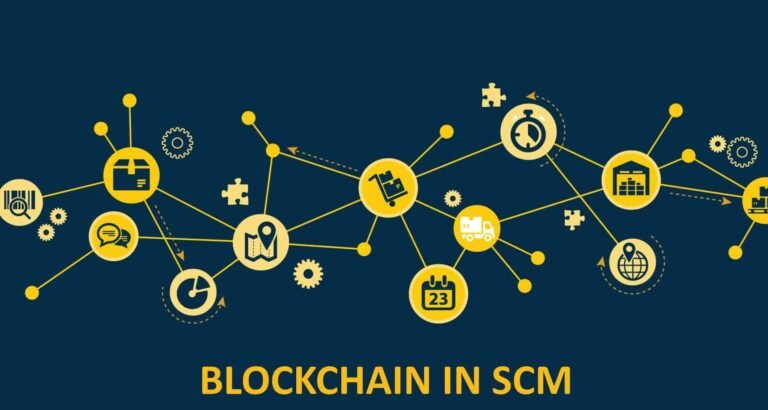Manufacturers, suppliers, shipping companies, and stores all play a part in the large and complex global supply chain of today. To handle transactions and track products, this network has, for decades, mainly depended on centralised databases, documentation, and external verifications. These conventional procedures, meanwhile, are sometimes slow, costly, and prone to human mistakes or fraud. With its distributed and tamper-proof character, blockchain technology is emerging as a transformative solution for many of these problems. This paper discusses the advantages blockchain presents, as well as some of its most interesting real-world use cases, and explores how supply chains are utilising it.
Transparency improved by blockchain technologies is one of their primary advantages for the supply chain. Data silos and limited view in conventional systems can cause fraud, inefficiencies, and uncertainty. Every supply chain actor can access the one shared truth created by blockchain. For instance, the AI & Blockchain Revolutionizing records each of those actions in real-time when a good passes from a manufacturer to a warehouse, then to a retailer. This provides everyone with an exact, time-stamped record of the product’s path, thereby reducing conflicts and enhancing cooperation among partners.
Blockchain Enhances Traceability and Efficiency
Another crucial benefit is improved traceability. In areas such as food, drugs, and luxury products, the ability to track the source and journey of a product can make all the difference between life and death or millions of dollars in damages. Blockchain minimises damage by enabling speedy recalls and easy identification of precisely where a contaminated or defective item originated. This degree of clarity ensures compliance with safety and regulatory criteria while also helping to combat counterfeiting.
The adoption of blockchains also largely depends on efficiency improvements. Companies can reduce paperwork, eliminate duplicates, and streamline the entire supply chain by automating tasks that typically require human input and verification. Smart contracts—self-executing agreements with pre-defined rules penned into code—can simplify processes even more. Once a shipment is confirmed as delivered, for example, a payment can be instantly triggered, therefore cutting the need for intermediaries and shortening the settling timeframes.
Trust and Efficiency Through Blockchain
The trust blockchain develops among players in the supply chain is another significant advantage. Transparent and verifiable data enable people who may not know or trust one another to work together nonetheless. In global supply chains, where participants are often scattered across multiple nations with diverse legal and regulatory systems, this is especially important. Blockchain provides a secure, consistent platform for conducting commerce, reducing the need for intermediaries.
Blockchain can also improve demand control and supply chains. Real-time data on stock levels, shipment status, and client demand enables companies to project their needs more accurately and make more informed decisions. This ensures that items are available when and where they are needed, helps reduce waste, and prevents stockouts.
Blockchain is already being used successfully in the supply chains of certain businesses and sectors. For instance, Walmart has partnered with IBM to utilise blockchain technology to track the origins of food products, including mangoes and lettuce. One may now trace in seconds rather than a week. This rapid traceability ensures food safety and enables a swift response to contamination issues.

Maersk and IBM launched TradeLens, a blockchain-based tool in the shipping sector that aggregates multiple stakeholders in the logistics chain, from customs officials to freight forwarders. TradeLens reduces delays, saves money, and enhances efficiency in global trade by digitising and automating the exchange of shipping documents.
The massive diamond company De Beers checks diamond authenticity using blockchain technology. From the mine to the final merchant, Tracr’s software tracks diamonds to guarantee they are ethically sourced and free from connections to conflict zones. This not only preserves the business’s reputation but also instils confidence in buyers’ purchases.
FedEx has also been investigating blockchain to improve logistics and resolve conflicts. Blockchain enables all parties involved in a shipment to access a single source of truth, thereby facilitating claim verification and conflict resolution regarding lost or damaged products.
Blockchain technology is also being widely adopted in the pharmaceutical sector. A significant global issue is the proliferation of counterfeit medications; blockchain technology helps by enabling the recording and validation of every step in a drug’s lifecycle. This ensures the availability of genuine and safe medicines, meeting the legal criteria established by the U.S. Food and Drug Administration.
Final Thoughts
Blockchain has particular challenges, despite its promise. Scalability is an issue, as public blockchains struggle to manage rapidly increasing transaction volumes. Particularly for businesses with deeply ingrained legacy infrastructure, integrating with current systems can be costly and challenging. Furthermore, the challenge of interoperability between multiple blockchain systems stems from the absence of consistent standards. Many nations also have legal ambiguities, which would make businesses reluctant to implement the technology completely.
Blockchain is proving to be a highly effective tool for modernising and securing global supply chains. It addresses many of the issues in conventional supply chains by offering transparency, traceability, and efficiency. Although obstacles still exist, the success tales from businesses such as Walmart, Maersk, and De Beers demonstrate how not just viable but also quite helpful the technology is. Blockchain solutions are likely to become a fundamental component in the future generation of global trade as more sectors explore them.


